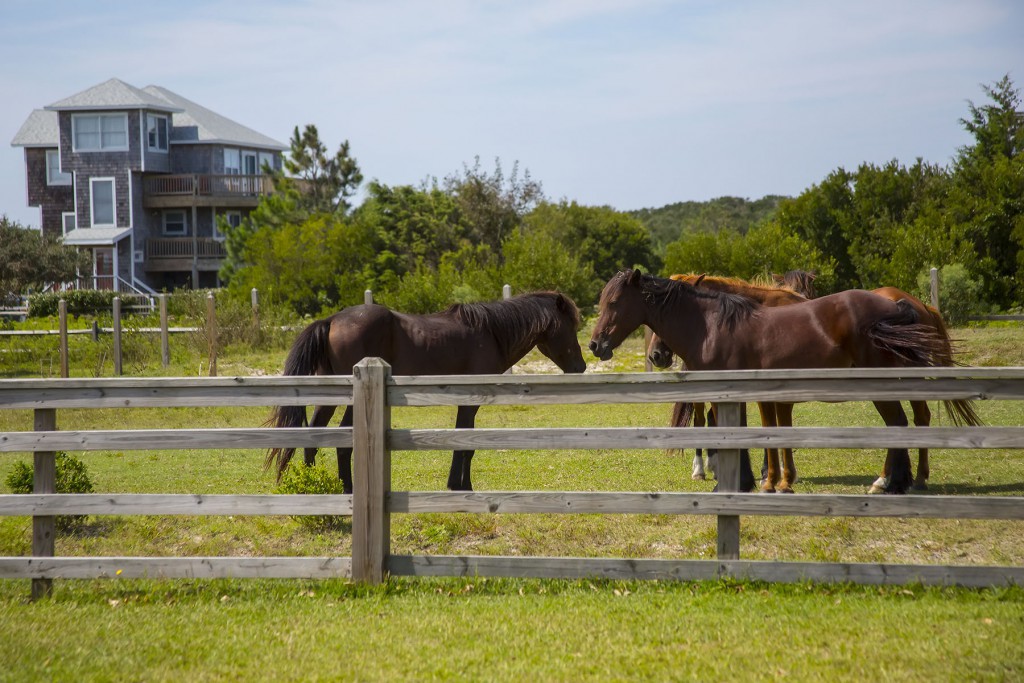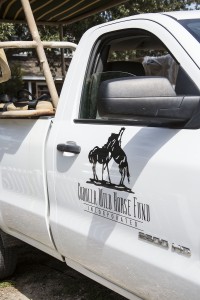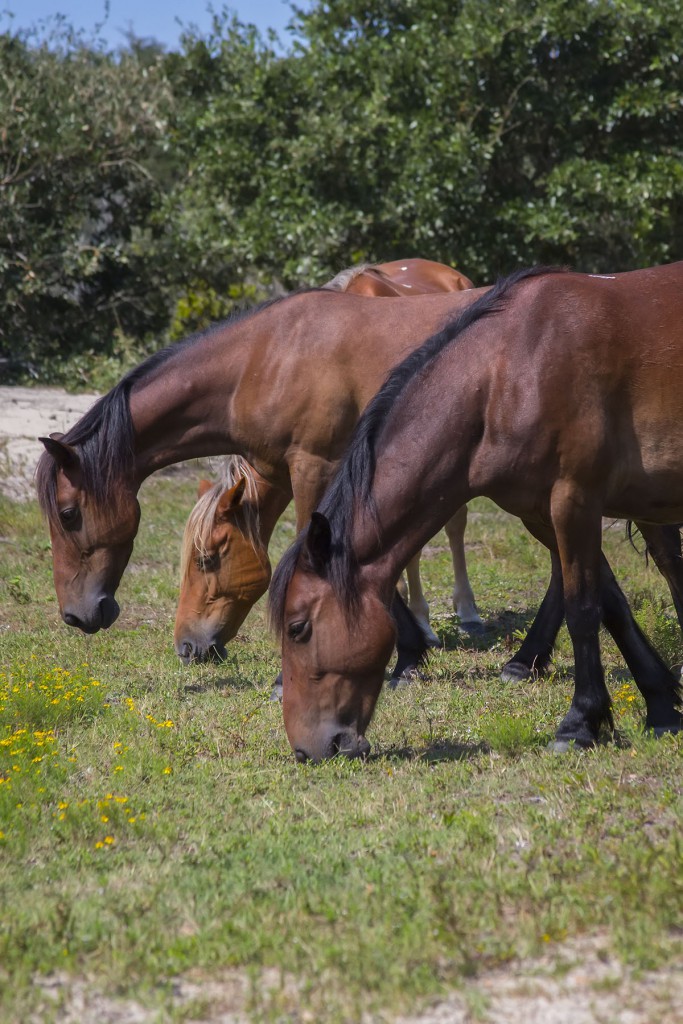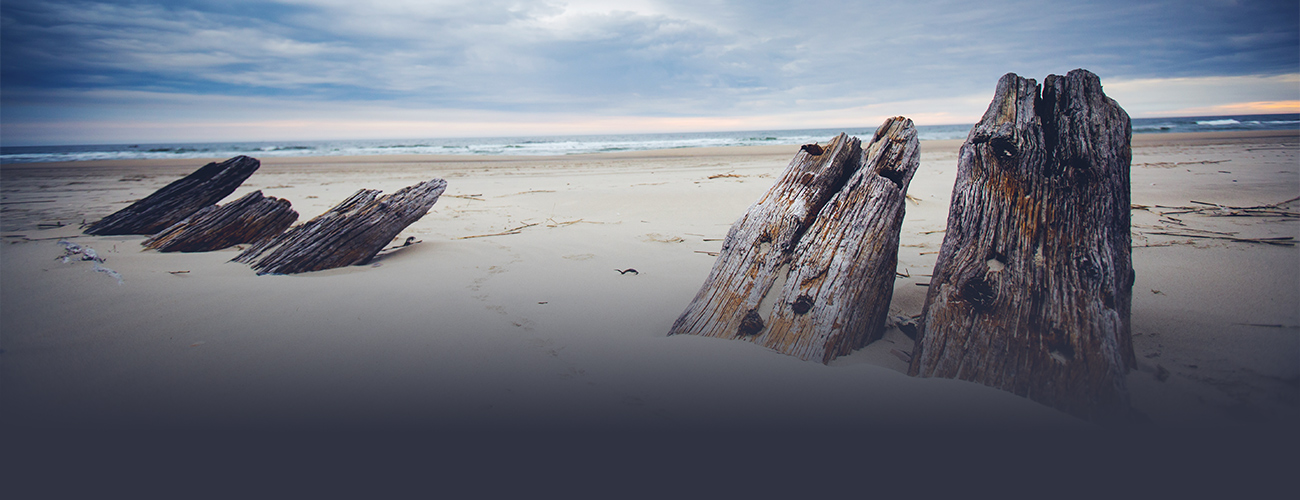A brown stallion and his harem of mares head slowly down the wet, packed sand of Swan Beach, one of Currituck County’s northern beaches. Here, where the ocean crashes against this strip of land in the Outer Banks of North Carolina, the wild Colonial Spanish Mustangs can escape the biting flies and insects kicked up by a west wind.
 On this warm autumn day, the harem may head into the water to cool off – all within view of nearby oceanfront rentals and a line of Jeeps and SUVs parked along the beach. A family sits quietly by the water several hundred feet away, watching the horses frolic.
On this warm autumn day, the harem may head into the water to cool off – all within view of nearby oceanfront rentals and a line of Jeeps and SUVs parked along the beach. A family sits quietly by the water several hundred feet away, watching the horses frolic.
For the mustangs, it is just another day at the beach. They have lived here for nearly 500 years.
For the rest of us, it is so much more.
The thrill of glimpsing such wild beauty in person is why visitors come throughout the year to witness the oldest and rarest strain of Colonial Spanish Mustangs in the world, a fact confirmed by DNA testing.
“It is the only place in the country where you can go out on your deck, with your cup of coffee and there are wild Colonial Spanish Mustangs in your yard,” says Karen McCalpin, executive director of the Corolla Wild Horse Fund, the nonprofit that cares for the herd. “It is truly incredible to see them in person, on the beach, living freely.”
Distinguishing features – from the way they walk, trot and canter to the shape of their heads, their over-sized hooves and low-set tails – reveal their Colonial Spanish heritage. Like their ancestors, they have one less vertebra. When viewed from the front, the space between their front legs is not excessively wide like other horse breeds.
While there are a few theories about how the mustangs came to the Outer Banks, the most documented one is from 1528. Spanish explorers sailing near what is now Cape Lookout National Seashore ran aground on sandbars. To reduce the ship’s weight and get it moving again, the sailors put the horses overboard. The horses were able to swim ashore in the shallow water.
They’ve been here ever since. In the summer, they find relief at the water’s edge. During the winter, the mustangs grow shaggy coats to stay warm. They are a living testament to the rich history of the Outer Banks and the many ships that became trapped in its shallow shoals – the graveyard of the Atlantic.
Less than 100 years ago, National Geographic documented 5,000 wild horses on the Outer Banks. Today, there are little more than 200 remaining wild Colonial Spanish Mustangs. Roughly 110 live on Shackleford Banks, a barrier island in Cape Lookout National Seashore, accessible only by boat or passenger ferry. Another 100 live here, on the northern beaches of Currituck County, among roughly 200 permanent residents and hundreds of guests who return year after year to enjoy the beach life and admire North Carolina’s official state horse.
Accessible only by off-road, 4×4 vehicles, the herd roams freely over 7,500 acres. The main highway here is a public beach. On one side of the barrier island, the Atlantic greets them. Across the sandy dunes, the horses can access the calmer waters of the Currituck Sound. They graze wherever they can – in a secluded meadow of live oaks, an open public park and practically everyone’s yard.
This area of the county is a designated home for the herd with fences to keep them from entering neighboring Virginia to the north and the densely-populated neighborhoods in Corolla that lie just south. Many of the expansive homes you can see from the beach are rentals for families who want a unique vacation experience. In the fall, people from all over the nation retreat here for an extended summer with fewer crowds.
 The easiest way to see the herd is by taking an educational tour with the Corolla Wild Horse Fund. The nonprofit operates year-round. Visitors can ride in a 12-seat, open air vehicle or in a SUV with heating and air-conditioning available. As the official caretaker of the herd, the nonprofit’s staff knows best where the horses might be spotted depending on the season and which way the wind is blowing that day.
The easiest way to see the herd is by taking an educational tour with the Corolla Wild Horse Fund. The nonprofit operates year-round. Visitors can ride in a 12-seat, open air vehicle or in a SUV with heating and air-conditioning available. As the official caretaker of the herd, the nonprofit’s staff knows best where the horses might be spotted depending on the season and which way the wind is blowing that day.
“A west wind in the summer is guaranteed to bring horses to the beach,” McCalpin says. “Quite a few of them will swim.”
During the tours, McCalpin and her staff happily share their in-depth knowledge of the horses, the herd’s history and its delicate existence with humans, which greatly depends on people keeping their distance.
Every tour helps protect the horses and their way of life by supporting the nonprofit’s ability to care for them if they become sick or injured. All proceeds from the tours are used to benefit the horses.
Sadly, the biggest threat to the horses is being hit by a car. Feeding the horses can also cause a painful death. Over the years, their bodies have adapted to a highly-specialized diet that consists of only native plants. If the mustangs eat an apple or carrot, something that might be OK for some domesticated horses, they can die from colic.
For everyone’s protection – horses and humans – state and county laws require people stay at least 50 feet away from the horses, no matter where they are. The horses appear tame because they are used to being around people, but they are still wild. If they feel threatened by people or other horses, they can bite and kick.
Stallions, territorial by nature, often charge and fight each other, oblivious to who might be standing nearby.
Indeed, if the horses approach people as they make their way into the water on a hot day, the law requires people to move away and create a distance of 50 feet between themselves and the horses. Violators may be fined $500.
“You must stay at least 50 feet away,” McCalpin says. “It’s for your own safety.”
Understandably, many people would like to get a little closer to the mustangs. Thanks to the nonprofit, they can do that safely every Friday from Memorial Day to Thanksgiving when the organization offers events called Meet a Mustang at its main headquarters in Corolla. During these special events, people can take selfies and pet a rescued mustang that’s become used to humans through training.
Over the years, McCalpin and her staff have rescued scores of horses that were sick, injured or in danger. Once they leave the herd, they can never go back. Many are adopted and live out long lives.
All of them have unique stories.
There’s the foal Phoenix, whose mother died after being hit by a vehicle. A stallion – dubbed Roamer by emergency dispatch – who repeatedly swam around a fence that extends into the sound to make his way through busy neighborhoods and dangerous traffic on Route 12. And sweet Amadeo – a one-eyed stallion who was caught in a dangerous riptide after fighting another stallion over a harem of mares.
With his one eye injured in the fight to the point of becoming blind, Amadeo struggled against the current as it carried him away from the beach and more than a mile south. Lifeguards and other rescue volunteers on jet skis were able to help him back to shore using a tow strap.
Today, he lives a happy life at a rescue farm for the Corolla Wild Horse Fund.
“Somehow, he knew that we were trying to help him,” McCalpin says.
These are the kinds of stories people hear when they take a tour with the nonprofit. The more people who understand the importance of the horses remaining wild, the more likely the herd will continue its long existence on the beaches of Currituck County.
“Our purpose is to connect people with our mission and let them know why it’s so important to protect and preserve this national treasure,” McCalpin explains. “It doesn’t matter what state you are from – these are nobody’s horses, but they are everybody’s horses.”
Tour Information:
Book online at www.corollawildhorses.com/tours/ or call 252-453-8002. Tours run year-round except major holidays. During busy summer months, book reservations early.
Tours cost $45 for adults; $20 for children 12 and under. Private tours and pricing available online.
Visitors are welcome to learn more about the wild horses at the nonprofit’s museum/store: 1129 Corolla Village Road, Corolla, NC.
Alice Warchol is a freelance writer based in Chesapeake, VA.

